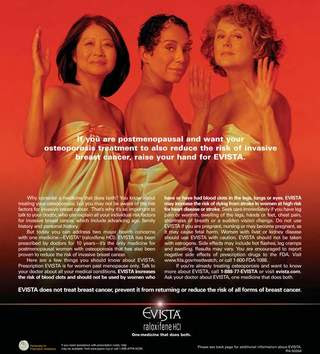 According to an IndyStar.com article, the new Evista ads “are raising a new round of criticism from some women’s health groups” (see “A new pitch for an old pill“). Lilly markets Evista.
According to an IndyStar.com article, the new Evista ads “are raising a new round of criticism from some women’s health groups” (see “A new pitch for an old pill“). Lilly markets Evista.
The issue is whether or not Evista’s breast cancer prevention benefit is worth the risk.
“Evista,” says the article, “has been shown to raise the risk of blood clots and fatal strokes. In one clinical trial of 10,000 patients with coronary problems and other health issues, women who took Evista had a 49 percent higher risk of dying if they suffered a stroke than those who took a placebo.
“The drug’s packaging insert even carries a black-box warning about those risks — the strongest warning required by the Food and Drug Administration.”
The article seems to be a “fair and balanced” critique and quotes a few different breast-cancer advocacy groups, some critical (eg, “This is not the approach we should be taking,” said Brenda Salgado, program manager of Breast Cancer Awareness in San Francisco. “We believe that any pill powerful enough to lower the incidence of breast cancer will most certainly cause other health problems and diseases. Why should we substitute one problem for another?”) and some supportive of Evista (eg, “Our hopes are really high for finding a way to prevent breast cancer long before the cancer forms,” said Connie Rufenbarger, a breast-cancer survivor from Warsaw, Ind., who runs the Catherine Peachey Fund, a nonprofit aimed at supporting cancer research and prevention.)
In fact, Rufenbarger goes so far as to say: “As far as risks, all drugs have risks,” Rufenbarger said. “Nobody is pointing a gun at us and saying we have to take these drugs.”
To me, this sounded suspiciously like a statement PhRMA might make and I decided to learn more about the Catherine Peachey Fund. What I learned was that the fund received funding from Lilly!
It wasn’t hard to find that little piece of information that was NOT mentioned in the IndyStar article. A link to a relevant press release was the #1 search result on Google! Talk about media standards, ethics, fact-checking and all that other high-brow stuff that distinguishes a true media reporter from a lowly blogger!
Here’s the relevant bit from the press release:
“The Catherine Peachey Fund primarily has been a grassroots effort by women and men touched by breast cancer,” said Mrs. Rufenbarger. “The establishment of the Catherine Peachey Breast Cancer Prevention Program moves that effort to a new level, which would not have happened nearly as quickly without a generous donation of matching funds from Eli Lilly and Company.”
“Maintaining breast health is of utmost importance,” said Cathy Sampier, manager of patient advocacy for Lilly Oncology’s U.S. affiliate. “We are pleased that our contribution to the Catherine Peachey Fund will ensure that Cathy’s efforts on behalf of breast cancer will continue to be honored and make a difference in people’s lives.”
That press release was dated January 8, 2002, about 2 years BEFORE Lilly “paid a $36 million fine to the government for claiming to doctors and consumers that Evista treats breast cancer before it got FDA approval to do so.”
Seems that the patient advocacy group at Lilly forgot to educate the sales people that while it is OK for Lilly to pay advocacy groups to tout the breast cancer benefits of Evista prior to FDA approval, it is NOT OK for sales and marketing to promote that use until AFTER the FDA approves it! Duh!
Another little quirk to this Evista story: Usually, when a drug has a black box warning it is the kiss of death for DTC (direct to consumer) advertising of that drug. But since the new Evista ads talk about breast cancer and NOT osteoporosis, I guess it’s OK to run DTC ads — no need to mention the black box stuff!









![6 Digital Tools at the Center of Healthcare Digitalization [INFOGRAPHIC]](http://ec2-54-175-84-28.compute-1.amazonaws.com/pharma-mkting.com/wp-content/uploads/2021/04/6DigitalTools_600px-100x70.jpg)




